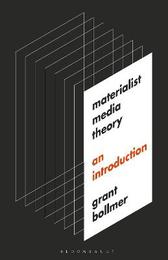
|
Materialist Media Theory: An Introduction
Paperback / softback
Main Details
| Title |
Materialist Media Theory: An Introduction
|
| Authors and Contributors |
By (author) Dr. Grant Bollmer
|
| Physical Properties |
| Format:Paperback / softback | | Pages:208 | | Dimensions(mm): Height 216,Width 140 |
|
| Category/Genre | Technology - general issues |
|---|
| ISBN/Barcode |
9781501337116
|
| Classifications | Dewey:302.23 |
|---|
| Audience | | Tertiary Education (US: College) | |
|---|
|
Publishing Details |
| Publisher |
Bloomsbury Publishing Plc
|
| Imprint |
Bloomsbury Academic USA
|
| NZ Release Date |
19 September 2019 |
| Publication Country |
United States
|
Description
Our technologies rely on an ever-expanding infrastructure of wires, routers, servers, and hard drives-a proliferation of devices that reshape human interaction and experience prior to conscious knowledge. Understanding these technologies requires an approach that foregrounds media as an agent that collaborates in the production of the world beyond content or representation. Materialist Media Theory provides an accessible, synthetic account of the cutting edge of the theoretical humanities, examining a range of approaches to media's physical, infrastructural role in shaping culture, space, time, cognition, and life itself. More than a mere introduction, Materialist Media Theory provides a critical intervention into matter and media, of interest to students and researchers in media studies, communication, cultural studies, visual culture, and beyond. Media determine our reality, and any politics of media must begin by foregrounding the media's materiality.
Author Biography
Grant Bollmer is Assistant Professor of Media Studies at North Carolina State University, USA, where he teaches in the Department of Communication and the PhD Program in Communication, Rhetoric, and Digital Media, and an Honorary Associate of the Department of Media and Communications at The University of Sydney, Australia. He is the author of the books Inhuman Networks: Social Media and the Archaeology of Connection (2016) and Theorizing Digital Cultures (2018).
ReviewsMaterialist Media Theory is much more than just an introduction. Instead, Bollmer's book is an attempt, and a very successful one, to reshape the domain of media studies by defending a special take on the major issues and stakes of the field as well as by critically rereading a large number of its foundational and contemporary thinkers. * Leonardo Reviews * The book will be especially useful for those interested in media theory. Nonspecialists will appreciate the survey of the major ideas in media theory and the compelling description of the interconnections between scholars. Advanced scholars will find the book helpful context for recent works in this field, for example, Daniel Reynolds's Media in Mind (2019). Summing Up: Recommended. * CHOICE * Grant Bollmer's Materialist Media Theory is a deceptive book: on the surface, it appears to draw a straightforward map of materialist media studies. Through Bollmer's accessible style and relatable case studies, he takes what is a rather abstract concept and makes its implications for the study of media refreshingly concrete and tangible. But beneath this surface, something far more complex is afoot, as Bollmer establishes the core tenets of a materialist approach to media, while subjecting these foundational theories to a rigorous and sustained skepticism. What emerges is an intellectually ambitious and politically urgent manifesto for the methodological and analytical utility of a materialist media studies. * David Parisi, Associate Professor of Emerging Media, College of Charleston, USA, and author of Archaeologies of Touch: Interfacing with Haptics from Electricity to Computing (2018) * Grant Bollmer's Materialist Media Theory is a crystal clear pathway into and a direct response to how 20th- and 21st-century media studies is defined by a distinctly materialist turn. He provides us with succinct yet sophisticated introductions to some of the most opaque theories about the so-called hard materialisms built into our everyday technologes. At the same time, Bollmer always counter-balances his overviews with interventionist reminders of how social, cultural, and political power establishes and perpetuates itself through the material structures of these same technologies. He performs the best kind of pragmatic criticism insofar as he continually reminds us that matter and materiality don't simply extend from technologies to their human users; instead, humans and media technologies are bound together by way of complex assemblages of material forces bouncing back and forth between the one and the other. In short, if you've ever wondered about the place of people and politics in materialist media theory, this book is a must-read. * Lori Emerson, Associate Professor and Director of the Media Archaeology Lab at University of Colorado Boulder, USA * [Emphasising] the intrinsic power of materiality itself and mak[ing] it compatible - quite successfully. * MEDIENwissenschaft (Bloomsbury Translation) *
|